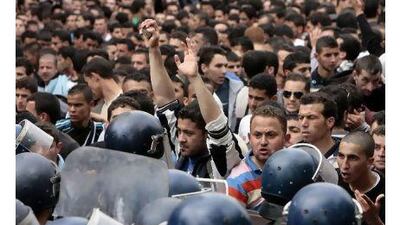ALGIERS // Martyrs' Square in downtown Algiers has been fenced off by ugly, rusted-metal construction barriers since mid-April and the smooth paving stones in one corner of the plaza have been chipped away. But to many in the Algerian capital it is clear that the work is not about urban renewal but about stopping political change.
Unrest in Algeria began about the same time that Tunisia exploded and ahead of Egypt's revolution. Riots over food prices rocked Algiers in January and several people were killed in protests.
In response, the government in February lifted the state of emergency that had been in place for almost two decades, since the start of savage violence between the state and Muslim fundamentalist militants in the early 1990s. President Abdelaziz Bouteflika also announced reforms, as yet unspecified and without a timetable.
In reality, however, the chance for meaningful political activity in the country remains as limited as ever.
Despite the lifting of the state of emergency, demonstrations in the capital are banned for security reasons, authorities say.
The government is throwing money at different groups that see a chance to press their financial demands. But there has been no reaching out on controversial political and human-rights issues. Among these are a continued ban on demonstrations, and the failure to open up radio and television to independent and opposition voices, or to provide greater transparency on the overseeing of the country's security forces.
Demands for change are resisted with the claim that the country is already free and that any change could reopen the door to fundamentalism and renewed violence.
To help ensure their survival, Algeria's rulers are eager to avoid turning people into martyrs. After the fatalities earlier this year, police have introduced measures to minimise casualties that have inflamed the situation in other countries.
Space for protests is being restricted by fencing off locations such as Martyrs' Square to allow police to break up large demonstrations into smaller and more manageable groups. Protesters are met with shields, batons and water cannon, and unarmed officers.
When students went on to the streets in mid-April, officers stood stoically while water bottles and other soft projectiles were hurled at them. The police finally charged, but even then the violence was limited.
One student protester who gave his name as Farid said of the demonstrations: "They failed to stop us today and we will not go away. We'll demonstrate again to ask for our rights."
The government's official position is that the situation in Algeria cannot be compared to that in other countries in the region. It is adamant that the process of opening up and democratisation began after widespread protests in 1988. Those demonstrations marked the end of one-party rule by the FLN, the movement that led the country to independence in 1962.
"Since 1988 we've gone through everything that other Arab countries are now going through," Nacer Mehal, Algeria's minister of information said. "That was when we started the democratic opening, media pluralism, economic competition, a law for allowing parties, judicial reforms."
But he acknowledged that the reforms introduced more than 20 years ago were incomplete, truncated by violence that followed the free elections of 1991 that were won by the fundamentalist FIS and then annulled by the army.
"Unfortunately, we encountered a problem, our black decade, with the eruption of violent political Islam and the threat of terrorism," Mr Mehal said. "So that was not a good time to realise our democratic goals."
Commenting on the government's promises of reform, he said: "We have no taboos, we are going to discuss the changes. Do we need a different electoral system, do we need to change to a parliamentary system? We can discuss all that."
But critics say that no steps towards reform have been made, and that the promises are vague and lack a timetable. Opposition politicians and human-rights activists doubt that meaningful change will come from the government, which they depict as the same club of generals and senior security officials that has ruled Algeria since independence.
Algeria's main opposition politician, Said Saadi, of the RCD party, said: "This regime is finished; it does not control anything any more. The state has decomposed." He views the government as a shell controlled by the "political police", the mukhabarat.
"But even the political police has lost its way. It has been the only reality of the state since 1962, but its control is slipping," Mr Saadi said. Algeria's 160,000 police officers had been in the forefront of the country's dissatisfied groups, he said, and the government had bought their loyalty with a salary increase.
Even so, the Committee for Change and Democracy (CNCD), which Mr Saadi is leading along with other opposition figures, has made little impact. Its weekly demonstrations have failed to attract the crowds that created momentum in Tunisia and Egypt.
Partly this is because the opposition is divided. Mr Saadi was reported to have had a falling out with at least one ally, Mostafa Bouchachi, of LADDH, the main human-rights group.
Mr Bouchachi says that any complacency on the part of the government is misguided. "When you look at the social, economic situation, the corruption, the lack of the rule of law, you realise these are the same facts that pushed for the revolution in Tunisia and Egypt."
But young Algerians regard Mr Saadi and other opposition parties as compromised by years of effective collaboration with the establishment and see Mr Bouchachi as lacking a constituency.

